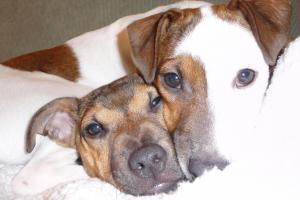The Facts About Canine Flu
- posted: Jan. 28, 2018
 Canine Influenza Virus: What You Need to Know
Canine Influenza Virus: What You Need to Know
You may have seen recent news stories circulating about canine influenza, including our own Dr. Spencer on ABC 27 News. While isolated cases of canine flu have been found in dogs in Pennsylvania in 2017 and 2018, there have not been any clusters of cases that would constitute and outbreak in our state. There was a recent outbreak or cluster of kennel cough cases (Bordetella infection) in Chambersburg, but this infection is different than canine flu.
So, how worried should we be about canine flu? Some dogs are at high risk for contracting viruses like canine influenza, which, by the way is highly contagious to dogs and has also been found in cats, but does NOT affect humans. High risk animals would be those in situations where there are large numbers of dogs together in close contact with one another: animal shelters, dog shows, boarding kennels, dog parks. There are currently two strains of canine flu virus in the United States, H3N8 and H3N2. These viruses are highly contagious and can be spread by aerosol droplets (airborne) such as with coughing or sneezing and the virus can also live on clothing, skin and surfaces like food bowls or cages for 12-48 hours.
What can be done to prevent spread of infection? If your dog is in any of the situations described above, consider having your pet vaccinated with a bivalent flu vaccine that covers both strains. Patton Veterinary Hospital does have this vaccine available so ask our staff if it is right for your dog. Unfortunately, there is currently no vaccination for cats, though cases have been very limited and do not appear to cause severe disease in our feline friends. If you work in a kennel, boarding or grooming facility or veterinary office, wash your hands frequently and clean all surfaces thoroughly.
The virus can incubate from one to eight days depending on the strain and dogs are most contagious during this period though they may not yet be acting sick. Affected dogs may start to show signs of coughing, sneezing, lethargy and fever which can last ten to twenty-one days. Similar to human flu virus, antibiotics are ineffective so dogs and cats are treated with supportive care until they recover. In rare cases, a more severe pneumonia may develop and occasional fatalities have been reported. Cats infected with the H3N2 virus display signs of upper respiratory disease, including nasal discharge, congestion, lethargy and salivation. Infected dogs or cats should be isolated from other animals for four weeks.
Canine flu can certainly present a risk to pets in south central Pennsylvania, but so far, the cases have been isolated and mild. Use good hygiene, do not allow your cat or dog to interact with other dogs or cats showing signs of respiratory illness such as those with coughing or runny noses and consider vaccinating your dog if he or she is frequently exposed to a lot of other dogs at a doggie daycare, boarding facility or other high risk situation. Be cautious and aware but don’t fear the flu!
This blog brought to you by the Patton Veterinary Hospital serving Red Lion, York and the surrounding communities.
For More Information, visit--https://www.avma.org/KB/Resources/Reference/Pages/Canine-Influenza-Backgrounder.aspx
Location
Patton Veterinary Hospital
425 E Broadway
Red Lion, PA 17356
